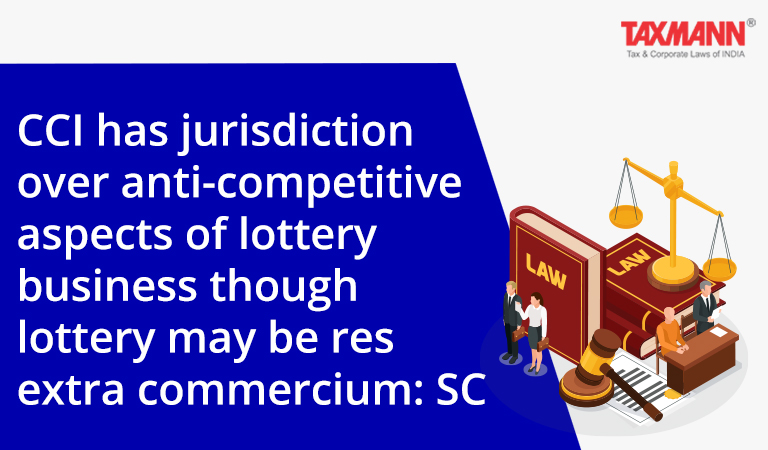CCI has jurisdiction over anti-competitive aspects of lottery business though lottery may be res extra commercium: SC
- Blog|News|Competition Law|
- 3 Min Read
- By Taxmann
- |
- Last Updated on 21 January, 2022

Case Details: Competition Commission of India v. State of Mizoram - [2022] 134 taxmann.com 199 (SC)
Judiciary and Counsel Details
-
- Sanjay Kishan Kaul and M.M. Sundresh, JJ.
Facts of the Case
The State of Mizoram had issued an Expression of Interest (EoI) inviting bids for the appointment of lottery distributors and selling agents for State lotteries regulated by the Mizoram Lotteries (Regulation) Rules, 2011 framed under the Lotteries (Regulation) Act, 1998.
The EoI was for appointment of lottery distributors/selling agents to organise, promote, conduct, and market the Mizoram State Lottery through both conventional paper type and online system. The EoI specified that the minimum rate fixed by the Government of India is Rs.5 lakh per draw for Bumper and Rs.10,000 per draw for others – bids less than these rates would be summarily rejected. In pursuance of the EoI, five bids were received of which four which quoted identical amount of ?10,000, were selected. The State had also asked the successful bidders to furnish a security and deposit amount
The Respondent No. 4 made a complaint to the CCI under Sections 3 & 4 read with Section 19(1)(a) of the Competition Act alleging that the State of Mizoram abused its dominant position as administrator of State lotteries, by requiring distributors to furnish exorbitant sums of money towards security, advance payment, and prize pool even before the lotteries were held.
Respondent No. 4 alleged that the bidders had cartelised and entered into an agreement that had an appreciable adverse effect on competition in the lottery business in Mizoram. There was bid-rigging and a collusive bidding process which violated Section 3(1) read with Section 3(3) of the Competition Act, and also caused grave financial loss to the State of Mizoram.
The CCI’s Director General (DG) found prima facie evidence on cartelisation and big rigging against the bidder companies, but the case against State was dropped by the DG.
The State of Mizoram moved to the High Court by filing a writ petition challenging the adverse remarks made against it by the CCI. The High Court by an interim order halted the CCI final orders. The High Court opined, was applicable to legitimate trade and goods, and was promulgated to ensure competition in markets that are res commercium.
Thus, lottery activity being in the nature of res extra commercium could not be covered by the Competition Act and consequently the CCI did not have jurisdiction to entertain the complaint of respondent no. 4, the High Court ruled. The CCI moved to the Supreme Court in appeal against the order
Supreme Court Held
The Supreme Court observed that though lotteries are state-regulated, the CCI has jurisdiction over the anti-competitive aspects of lottery business like bid-rigging in tendering process for appointment of selling agents and distributors. The CCI can order a probe into any perceived bid rigging in appointment of selling agents & distributors of lotteries.
Lotteries may be a regulated commodity and may even be res extra commercium. That would not take away the aspect of something which is anti-competition in the context of the business related to lotteries. “We must take note of the expansive definition of ‘Service’ under Section 2(u) of the Competition Act. It means “service of any description”, which is to be made available to potential users.” Said Court
The purchaser of a lottery ticket is a potential user and a service is being made available by the selling agents in the context of the Competition Act. Suffice for us to say the inclusive mentioning does not inhibit the larger expansive definition.
The lottery business can continue to be regulated by the Regulation Act. However, if in the tendering process there is an element of anti-competition which would require investigation by the CCI, that cannot be prevented under the pretext of the lottery business being res extra commercium (thing beyond trade/commerce), more so when the State Government decides to deal in lotteries.
Disclaimer: The content/information published on the website is only for general information of the user and shall not be construed as legal advice. While the Taxmann has exercised reasonable efforts to ensure the veracity of information/content published, Taxmann shall be under no liability in any manner whatsoever for incorrect information, if any.

Taxmann Publications has a dedicated in-house Research & Editorial Team. This team consists of a team of Chartered Accountants, Company Secretaries, and Lawyers. This team works under the guidance and supervision of editor-in-chief Mr Rakesh Bhargava.
The Research and Editorial Team is responsible for developing reliable and accurate content for the readers. The team follows the six-sigma approach to achieve the benchmark of zero error in its publications and research platforms. The team ensures that the following publication guidelines are thoroughly followed while developing the content:
- The statutory material is obtained only from the authorized and reliable sources
- All the latest developments in the judicial and legislative fields are covered
- Prepare the analytical write-ups on current, controversial, and important issues to help the readers to understand the concept and its implications
- Every content published by Taxmann is complete, accurate and lucid
- All evidence-based statements are supported with proper reference to Section, Circular No., Notification No. or citations
- The golden rules of grammar, style and consistency are thoroughly followed
- Font and size that’s easy to read and remain consistent across all imprint and digital publications are applied



 CA | CS | CMA
CA | CS | CMA
